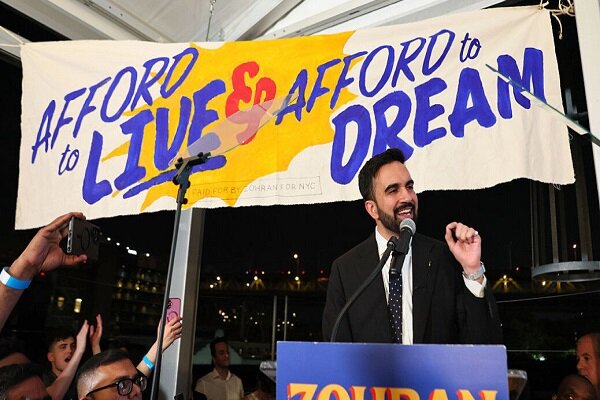French Response to Zohran Mamdani’s Victory: Inspiration for the Left, Doubts on the Right

Guest commentary by Amirhossein Moghimi: Zehran Mamdani, the 34-year-old socialist Democrat candidate, secured over 50% of the vote to rise from a relatively unknown state legislator to one of the prominent figures in the US Democratic Party. He is set to become New York City’s first Muslim mayor, first South asian mayor, and first mayor born on the African continent.
Mamdani’s campaign focused on making life more affordable in New York. His victory reflects the failure of Andrew Cuomo’s controversial tenure. one key challenge ahead for Mamdani is confronting former President Donald Trump, who previously threatened to cut federal aid to New York if Mamdani won.
the rise of this young Muslim son of immigrants has sparked extensive coverage in France-a nation still struggling with political minority representation.moreover, his campaign priorities such as housing, public transportation, and social justice echo everyday concerns in France. As a result, French media and political circles quickly embraced this event as a moment for rethinking left-wing discourse and direction.
France’s left-wing factions view Mamdani’s victory as a sign of revitalization for radical left politics and genuine representation for lower socioeconomic classes. Simultaneously occurring, right-leaning and centrist groups express skepticism about whether this model can be successfully applied within French political culture.
French left parties-especially La France insoumise (LFI) led by Jean-Luc Mélenchon-were among the first to praise Mamdani’s win. Mélenchon wrote on X: “In New York, Mamdani defeated the traditional Democratic machine; radical left politics are still alive.”
Leaders from the Green Party and progressive Socialist factions also hailed his success as proof that the left can address economic challenges and represent disaffected voters effectively. Mathilde panot,head of LFI’s parliamentary group,emphasized that Mamdani campaigned “with honesty and courage-the very qualities voters crave today: politicians without masks.”
By contrast, right-wing and centrist forces-including Republicans and members of France’s National Assembly-reacted cautiously or critically. Analysts from these groups argue that social conditions differ considerably between France and America; heightened sensitivity around explicit religious or ethnic identity could hinder direct adoption of such a model in french politics.
Zehran Mamdani’s victory serves less as an immediate template for French politics than as an inspiring political symbol for its left wing. This event offers an chance to rethink progressive multicultural discourse but underscores how structural hurdles rooted in history make realizing those ideals challenging.


